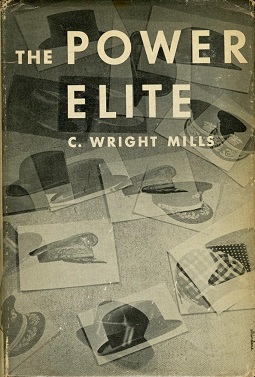
(wikipedia photo)
Some of my fellow students at SFU were working toward a fairly precise goal. They wanted to be teachers, doctors, corporate leaders, etc. For them university was a preparation for a specific profession. For me SFU was also a time of preparation, I just didn’t yet know where it would lead. Because of this, I still could not entirely shake a gnawing sense of uncertainty, much like a man with a blindfold shooting a a target he knows is there, but cannot see. I knew only I could not turn back. I must have faith that there would be a positive outcome. Not having a specific occupational objective, I hoped the courses I enrolled in would provide a solid basis for future employment.
I enjoyed courses like English, history and psychology, but it was PSA (political science, sociology and anthropology) that captivated my interest. Several radical left wing professors were particularly influential. Their personalities, lectures, passion and commitment persuaded me to re-examine and re-evaluate what I had learned in elementary and high school.
There had been a preponderance of emphasis given to British history, values, political systems, societal structures and much more. Beginning with King John signing the Magna Carta under duress from Barons at Runnymede in 1215, I had learned about the slow march to the achievement of voting rights and what we now think of as democracy. Only much later did I learn that after the Barons departed, the King persuaded the Pope to declare the agreement invalid. It was a case of those in positions of power collaborating to ensure their authority remained intact .
I was raised in a conservative culture. My parents and most of their friends were staunch supporters of W.A.C. Bennett, leader of the B.C. Social Credit Party and premier from 1952-1972. As a teen I at times attended political meetings and rallies with my father. When I was old enough to vote I faithfully followed my parents’ example.
A variety of societal influences had engendered in me an implicit trust in our national and provincial governments, but now I was becoming vaguely aware of what appeared to be a lack of integrity at higher echelons of Canadian society. I had been attracted to SFU in part because of its reputation for challenging embedded ideas. Upon arriving on campus I quickly became immersed in a cauldron of restless dissatisfaction. The radical professors espoused unflattering views of the political and societal universe. Lectures and also books on the reading lists began expanding my awareness and understanding of social and political dynamics.
C Wright Mills, for many years a professor at Columbia University, very effectively challenged my thinking in “The Power Elite” (1956). He contended that military, economic and political leaders share deeply interwoven interests. He suggested that ordinary citizens are relatively powerless and subject to manipulation. Mills argued for public and political engagement rather than complacent observation.
I was also influenced by sociologist John Porter’s “The Vertical Mosaic” (1965), the first comprehensive study of the national structure of class and power in Canada. Prior to this time, conventional wisdom had been that Canada was an egalitarian society where people from all backgrounds could succeed. Porter presented statistical data regarding enormous inequities of income, wealth and occupational opportunities in Canada.
My perspective on life in Canada changed in that first year at SFU. The change was tempered by the fact I had grown up in a stable home and culture. Men gravitated to trades, farming, teaching, business etc. It was a time when many women stayed at home, raising children, preparing meals, participating in a club or church. Some held jobs like teaching, nursing or secretarial work. People reached out to those in need.
As a teen the most significant influence on my thinking was my father. He owned a large bulldozer and in summers I went to work with him. At that time the Fraser Valley was still largely covered by trees and he did a lot of land clearing. He taught me how to blow large stumps out of the ground with 20 per cent dynamite, set effective fires to large stump piles, run a change saw, operate the cat, and much more. His honesty, diligence, patience and skill with equipment captured my respect. I never referred to him as “the old man.”
Looking back now I highly value the academic education I received at SFU. I also value the life education Linda and I received from our parents and their friends. It was a combination that provided essential ingredients for a fulfilling life.
